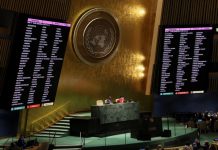French President Emmanuel Macron has strongly condemned the ‘inexcusable’ police killings of pro-Algerian demonstrators in Paris 60 years ago as ‘crimes’. However, a formal apology is still pending to come.
Macron told relatives and activists on the 60th anniversary of the bloodshed that crimes were committed on the night of October 17, 1961, under the command of the notorious Paris Police Chief Maurice Papon.
A statement issued by his office said, “recognized the facts: that the crimes committed that night under Maurice Papon [the then police chief] are inexcusable for the Republic.”
Macron attended the ceremony but made no public speech there. Although without a formal apology, Macron’s words went further than those of his predecessor, Francois Hollande, who acknowledged in 2012 only that the protesting Algerians had been “killed during a bloody repression.”
Macron is the first French head of state to have participated in the commemorations of the massacre, alongside survivors, civil society activists and veterans of Algeria’s struggle for independence.
The darkest day in France
The protests on October 17, 1961, were called in response to a strict curfew imposed on Algerians to prevent the underground FLN resistance movement from collecting funds following a spate of deadly attacks on French police officers.
More than 25,000 gathered in Paris in protest of French actions in Algeria despite the ban. The police arrested about 12,000 Algerians, beat several to death and shot others at the time.
It is still a mystery how many were murdered at the protest that night, but the historical consensus is that the toll ran at least into the hundreds— despite the original official toll of just Some activists fear several hundred could have been killed, including demonstrators whom police threw into the Seine, where they drowned. Others were beaten to death or fatally shot.
The events of October 17 sparked a spree of violence lasting for weeks. For decades, the atrocities were covered up. Many of the victims’ remains have never been found.
Papon, the Paris police chief, was later found to have been a Nazi collaborator during World War II, which added further shame to the events of that day.
No official apology
A report commissioned by the president from historian Benjamin Stora earlier this year urged a truth commission over the Algerian war but Macron ruled out issuing any official apology.
Another historical commission set up by Macron also found that France had overwhelming responsibilities over the 1994 genocide in Rwanda, in a finding that has led to a certain thawing in ties between Paris and Kigali.
“France is looking at all its history with lucidity and recognises responsibilities that have been clearly established,” the Elysee said.









